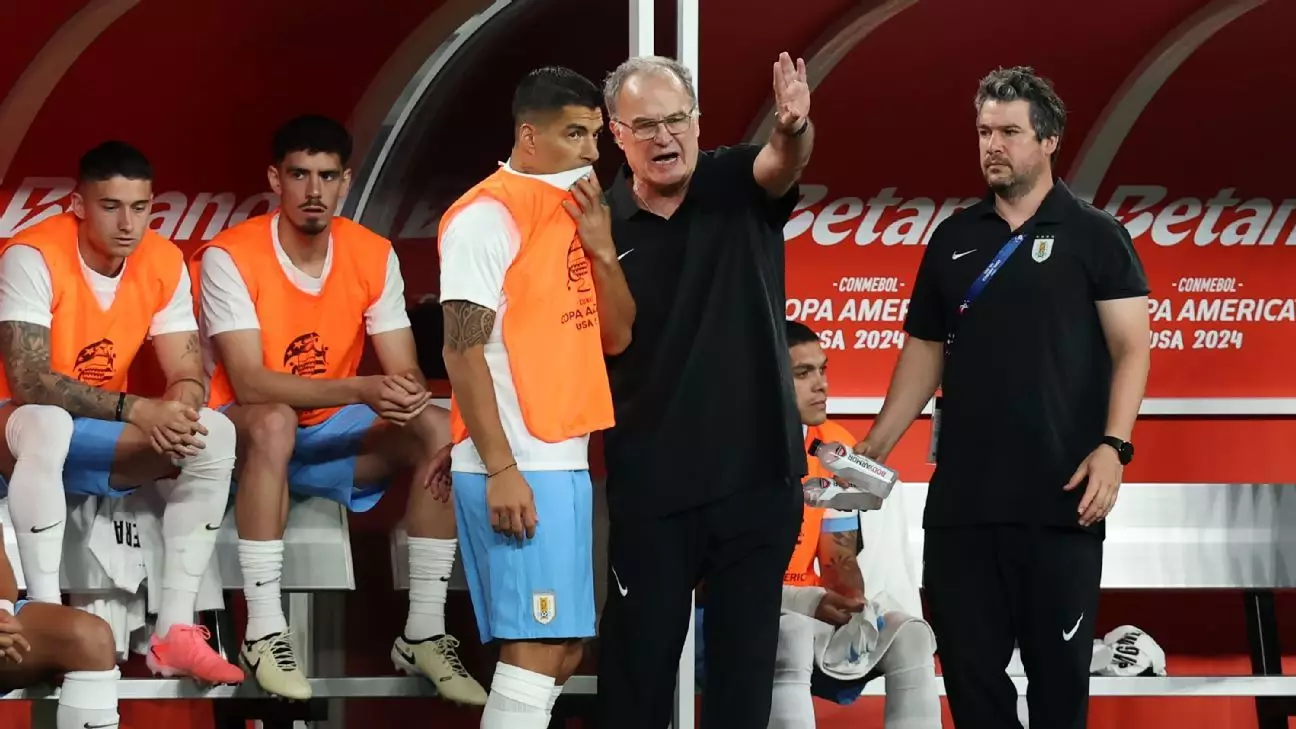In a heartfelt revelation, former Uruguayan striker Luis Suárez shed light on the troubling dynamics within the national team under the leadership of head coach Marcelo Bielsa during the 2024 Copa América. Suárez’s candid remarks not only reflect his personal experiences but also raise essential questions about team morale and the implications of managerial styles in sports. His call for empathy towards the players brings attention to the often-overlooked psychological and emotional aspects of athletic performance.
Since taking the helm of the Uruguay national team on May 15, 2023, Bielsa’s methods have drastically altered the team’s internal culture, as pointed out by Suárez. The atmosphere at the Celeste Complex has become increasingly restrictive, with staff and players facing protocols that diminish camaraderie. Suárez described how employees are prohibited from interacting casually with players, illustrating a divide that stifles interpersonal connections that are vital in team sports. This transition from a collaborative environment to one bordered by strict barriers is not merely bureaucratic; it impacts team dynamics profoundly.
Suárez voiced concerns surrounding the noticeable lack of communication between the coaching staff and the players. The emotional disconnection was so severe that players organized a meeting to request basic greetings from Bielsa, a plea indicative of deeper issues. Such a request reflects not only a yearning for respect but also a desire for unity. Suárez’s comment that “there were situations at the Copa América that hurt me” reveals an emotional strain that can impede performance on the field. Estrangement among teammates could lead to unpredictable outcomes, suggesting that both psychological health and strategic success are deeply intertwined.
The incidents during the tournament did not end with communication gaps; they turned confrontational. Suárez recounts a moment during a conference where Bielsa discouraged players from interacting with fans. This approach sparked dissent, leading Suárez to assert the importance of maintaining a personal connection with supporters. Such conflict illustrates the larger theme of how management styles can directly affect team morale. When players are barred from engaging with the community that supports them, the foundation of trust and motivation begins to crumble.
Legacy of Suárez and Future Concerns
Having retired from international play on September 6, Suárez left behind an unmatched legacy as Uruguay’s all-time leading scorer. Still, he expressed concerns for the future of the team as they prepare for the 2026 World Cup qualifiers. The statistics might show Uruguay performing reasonably well in the current qualifiers, sitting third in the Conmebol rankings. However, Suárez’s caution against placing blame on players in case of setbacks speaks volumes about his awareness of the ongoing repercussions of Bielsa’s strategies. He recognizes that beyond mere numbers, team cohesion and a healthy working environment are crucial for future success.
As the Uruguayan team gears up for their next match against Peru on October 11, Suárez implores fans to foster understanding of the challenges faced. His plea highlights a fundamental truth in sports—the human element. Fans often focus on results, neglecting the psychological pressures that players endure. Suárez’s comments underline a call to action, urging supporters to recognize the team as a collection of individuals navigating complexities beyond the field.
Luis Suárez’s revelations about the national team’s management under Bielsa offer significant insight into how powerful coaching practices can shape not only game play but also the emotional health of athletes. His emphasis on unity, respect, and understanding calls for a reevaluation of how fans view the players’ performance. As Uruguay heads into a new chapter with their sights set on higher stakes, it becomes increasingly vital to cultivate an environment that encourages both success and well-being, ensuring that La Celeste emerges stronger—together.


Leave a Reply